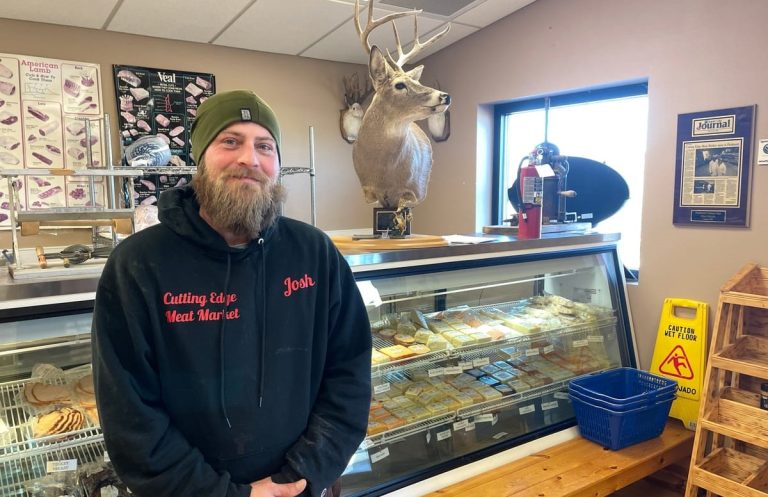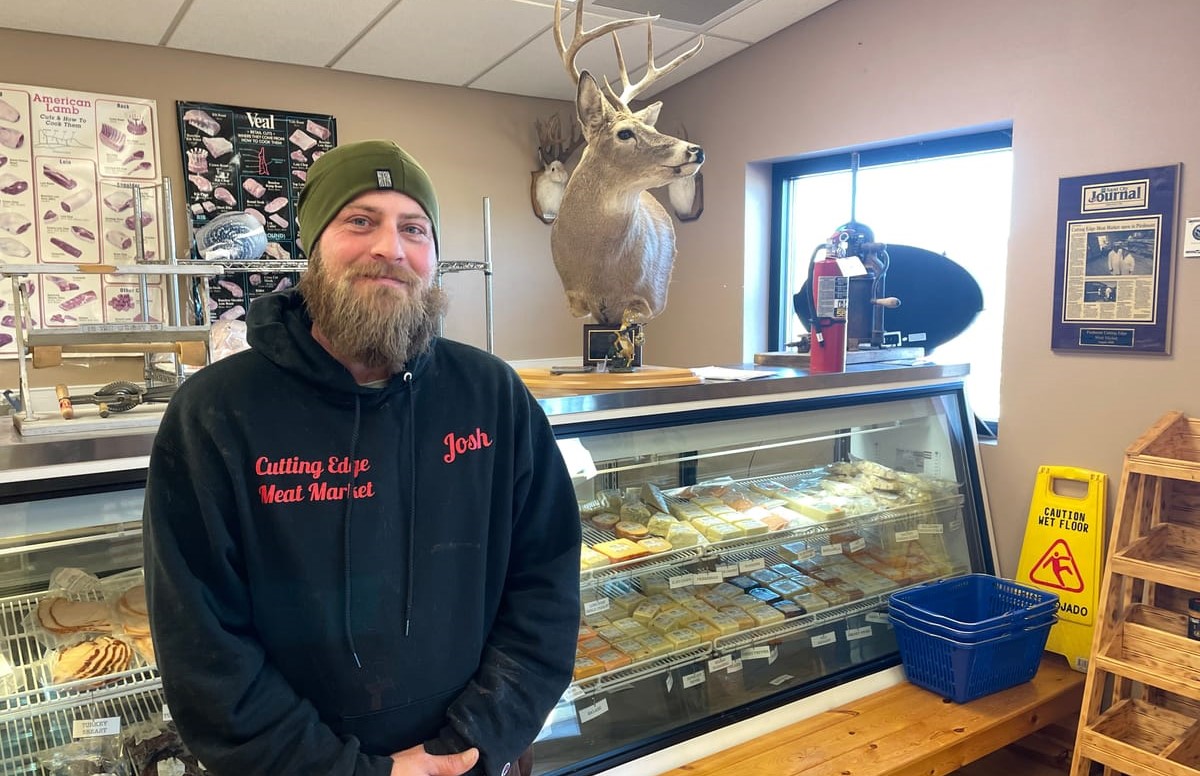WESSINGTON, S.D. – Shannon Duxbury’s great-great-grandpa homesteaded in Beadle County in 1884. And while the family’s ag heritage runs deep in Beadle County, it is change, not tradition that the Duxbury family embraces.
“Change is not scary here. Change is encouraged,” explained Shannon, 28, a sixth-generation cattle producer.
“Grandpa was never stagnant or complacent and Dad really embodies that too. Dad has never said, ‘we are going to do it this way because this is the way it has always been done.’”
Shannon’s grandpa, Robert, served as Secretary of Agriculture during the Kneip administration and went on to serve in the South Dakota Legislature for 22 years. Robert Duxbury was also a South Dakota State University animal science professor and livestock judging coach. He served for many years as a member of the South Dakota State Fair board.
Shannon’s dad, Dale, took over the family ranch full time from Uncle John Radcliffe in 1998.
“Raising cattle, ranching and farming is all I’ve ever done,” Dale said.
As the story goes, Uncle John frequently relied on Dale’s mom, Rose, for help on his farm. While at the same time, Robert also relied on Rose to keep things going while he worked off the ranch, serving as South Dakota Secretary of Agriculture.
“One day, my Uncle John came storming into the house to get Mom to help him and she said, ‘No. If you want help, take Dale,’” explained Dale, 64, of how he came to begin working for his Uncle John.
Dale was 12.
In 1998, Dale took over John’s crop and cattle operation and since that time, the family operation has evolved from a crop and cattle operation to a ranch solely focused on cattle.
“We learned how to lose.”
In addition to a traditional cow/calf herd, for nearly two decades the family raised cattle for the show cattle market. Shannon and her older brothers, Brady and Troy, enjoyed showing cattle, even though Shannon said it’s tough to win when your family sells their best calves to the competition.
“We learned how to lose quickly,” Shannon said. She added that traveling the U.S. to show also helped the siblings develop lifelong friendships and communication skills.
“When you are at a show, you meet people from everywhere. So, I know how to talk to strangers. I may not always enjoy it, but I know how to do it,” Shannon explained.
Shannon’s mom, Sandy, said she appreciated the work ethic her children developed showing cattle and working on the ranch.
“The kids would get home from school activities and go to the barn to work with show calves, and then do homework,” Sandy said. “There were many times they did not get to bed until midnight or 2 a.m.”
Shannon added, “We always knew where the priority was. We didn’t open Christmas gifts until after the cattle were fed.”
Shannon is the youngest sibling. And when she decided to quit showing to focus on her career, the family got out of the show cattle business. Today, she works full time in research and development for a livestock genetics company.
Her brother, Brady, works as the Agriculture Education teacher/FFA Adviser in Wessington Springs. He and his wife, Danielle, have three children.
Her brother Troy works in business development for an environmental product company. He and his wife, Casey, have two children and live in Wessington Springs.
Duxbury Beef
For about a decade, the Duxbury family has managed a large recipient herd (embryos are implanted into Duxbury cows and the family is paid to take care of calves from birth through weaning). And about five years ago, together with their herdsman Adam Haake, the family launched Duxbury Beef.
Duxbury Beef is a ranch-to-table business. Premiere Akaushi-influenced beef that is born and raised on the Wessington ranch are direct marketed to consumers from across the nation. Akaushi means red cow in Japanese.
The family has been able to find synergies in their embryo business and Duxbury Beef by turning out Akaushi bulls with the cows that received embryo transfers. This way, any animals that do not conceive with the implanted embryo can produce a calf for Duxbury Beef. Haake and Dale utilize ultrasound pregnancy diagnosis to determine the calf’s origin.
“Our family business has changed drastically over the years. Being able to evolve as the industry has evolved has allowed our ranch to remain relevant,” said Shannon, who makes time outside of her full-time career to manage Duxbury Beef website and marketing from her home in Harrisburg.
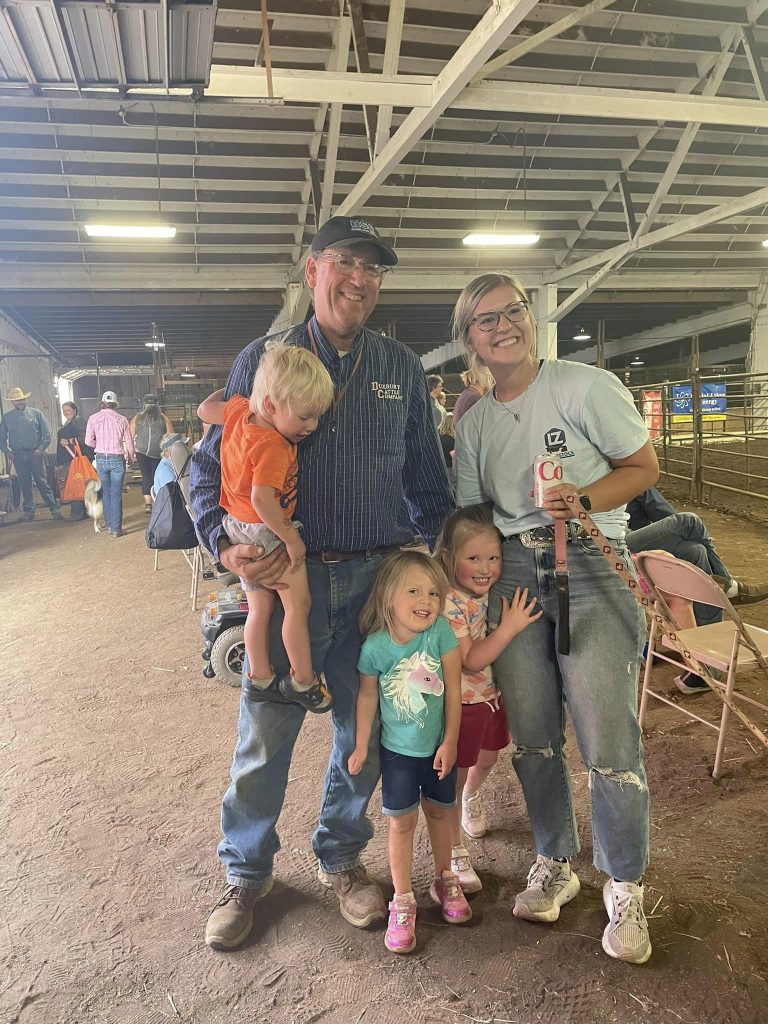
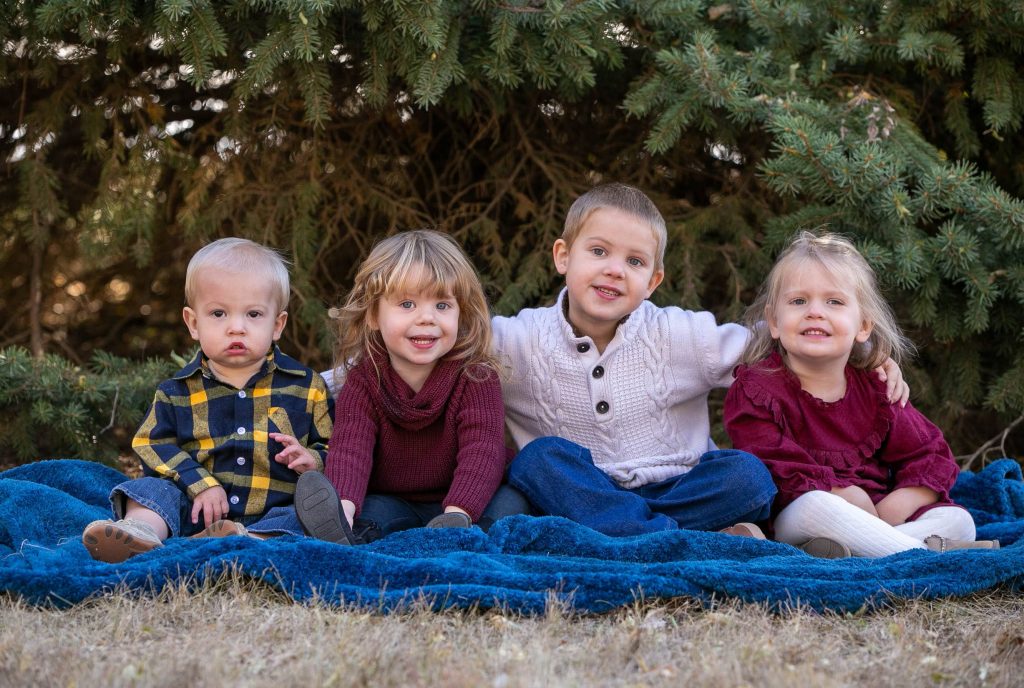
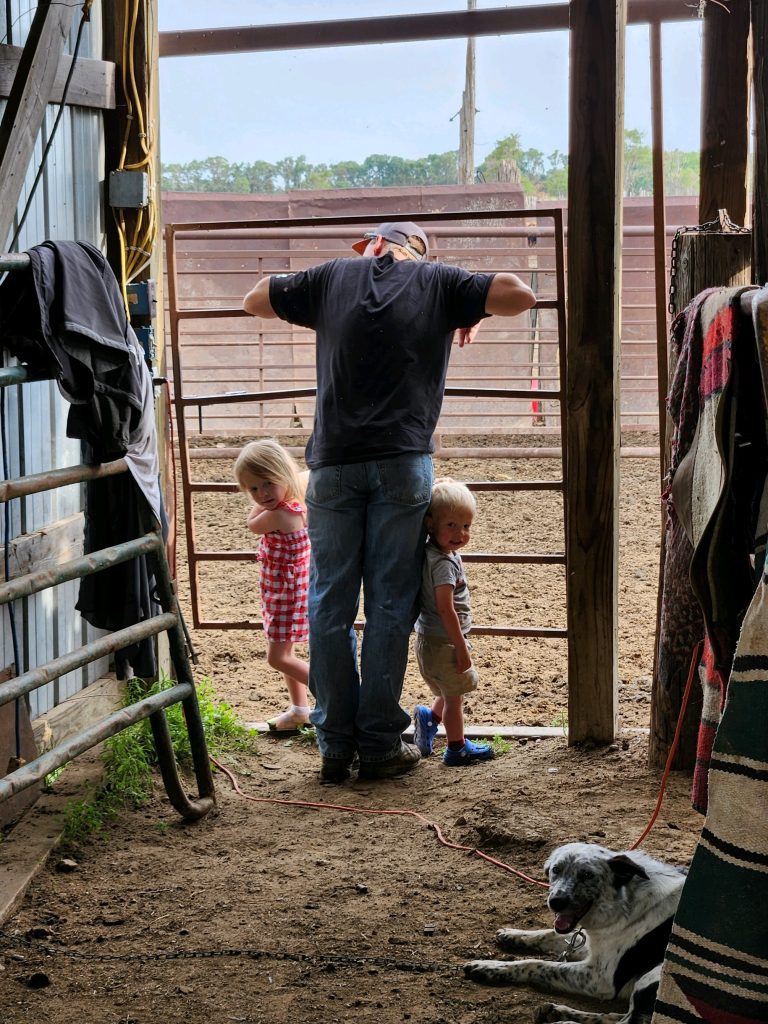
Change = Sustainability
Maintaining a philosophy that change is not scary has kept the family ranch sustainable.
Dale explained that since the beginning, necessity has most often been the driver of change on their ranch. Around the time Dale and Sandy married, it was Mother Nature who steered Dale off the traditional path.
“I planted a crop and bought 21 cows. One July evening in 1985 I moved the windrowers up to the field with the plan to cut oats in the morning. The next day, the crop got hailed out. I got zero. April of 1986 an ice storm came in and we lost 17 of 21 calves. The bank didn’t want to talk to us, so we sold the cows.”
After hearing of Dale’s loss, an area cattle producer stepped in to help. “He brought me 100 heifers and told me to learn to AI (artificial inseminate). He said we could breed them, calve them and breed them back. He let us keep all the heifers’ calves. It was the only way I could get started up in the cow business again,” Dale said.
Shortly after Dale graduated from AI school, Sandy went back to school to finish a degree in business management. She worked for the state as an auditor for nearly a decade and continues to work for an accounting firm today.
Duxbury Beef was also born out of necessity, herdsman Adam Haake explained.
“Dale had some fats in a pen, and I asked for a quarter of beef. He said, ‘If you sell a couple whole beef you can have a quarter.’ That is how it got started,”’ Haake said. “The next time there were 15 in the lot. And then there were 30.”
“Duxbury Beef would not exist without Adam,” Shannon said. “Adam brought a unique perspective to the whole thing because the only people we know are cattle people, so no one needs beef. Also, we never think of eating beef as a luxury – we always have a freezer full of beef.”
Before moving to South Dakota, Haake wrestled full time and trained at the U.S. Olympic Training Center. When he was looking to sell beef, he began by calling up some of his former teammates. A neighbor’s brother who used to play football for the University of Georgia Bulldogs also connected some of his teammates with Duxbury Beef.
Through word of mouth, Duxbury Beef continues to grow. In 2023, Haake and the Duxbury family finished 100 head to sell through Duxbury Beef.
“It is unbelievable how many people have never had beef right off the ranch. They say they can taste the difference,” Dale said.
“I have had guys say, ‘what will I do with all this ground beef,’ and I say, ‘throw it on the grill and call me back.’ They figure out what to do real quick,” Haake said. “I have actually sent freezers with the quarters of beef because they don’t have a freezer.”
Dale explained to enhance the meat’s flavor he manages the cattle raised to sell through Duxbury Beef a bit differently.
“We try to grow the calves longer on grass. I think the key to our flavor consistency is we let them grow up before we work to get them fat. We don’t try to finish them before they are ready,” Dale said.
“And we work with the meat lockers to have them aged longer,” Haake added.
Finding meat lockers for the volume of meat they need to process, as well as processors who are willing to work with their specific needs is a challenge, but it is one they are willing to travel for.
“Friends will ask me if selling direct is worth it. It does take extra time. I spend a lot of time on the road hauling cattle to meat lockers. I just got back from driving a trailer-load to Georgia,” Dale said.
However, he added that the Duxbury Beef team has decided that the extra investment in time and money is worth it. Dale said he enjoys hearing feedback from consumers.
Sandy said she appreciates the fact that a portion of the family’s income is not linked to the market.
“Duxbury Beef gives us cash flow throughout the year,” Sandy said. “Before we were only paid once or twice a year.”
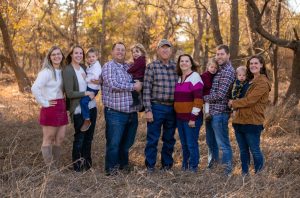
Duxbury Beef, like the rest of the Duxbury ranching operation, is successful because of joint efforts of family and herdsmen Haake and Lon Nelson.
Haake came to work for the Duxbury family in 2016. He had been working for an area crop and livestock farmer who sold out of the cattle business. Dale knew Haake enjoyed working with livestock, so when he heard about the change, he gave him a call. Haake came to work for Dale. A few months later, Haake recruited his friend and former co-worker Lon Nelson.
“I love working here. I love working with the cattle and watching them mature,” Haake said. “Hard work is rewarded here and does not go unnoticed.”
In addition to fair pay, Dale offers the men the option of running up to 50 head of cows on the family ranch with the expenses covered by the Duxbury family as part of their hiring agreement. Haake appreciates the opportunity to raise a herd of cows, Nelson chooses not to, he joked, “I always say the only guy making money on the ranch is the hired hand because he gets paid. I like the work here.”
In a day and age when many struggle to find good help, Dale said he values Nelson and Haake and works to ensure they understand their value to the family operation.
“Here, hard work is rewarded, and it is appreciated,” Haake said. “And Dale is working seven days a week with us. It is hard to find a boss that is willing to work as hard as you are.”
Shannon added that her family thinks of Haake and Nelson more like family than employees. “There is love behind everything we do – even if we don’t always agree or get along. We are family. So, we have the freedom to get mad at each other sometimes. I always say, ‘we are one big, messy complicated family even though we are not all related.’”


